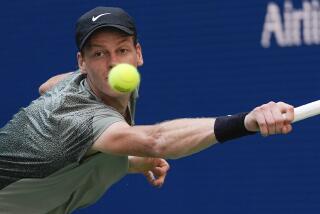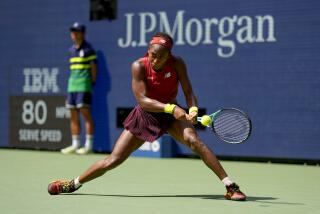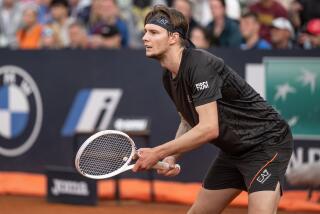U.S. Open Notebook : The Germans and French Make Their Marks
- Share via
NEW YORK — Geography and sociology lessons gleaned from the first week of the U.S. Open, which is now history:
--Americans are noisy and arrogant and hot-tempered--and that goes for some of those who watch the tennis, too.
--The Swedes say Americans also worry too much about being No. 1. Swedes say they play for the sheer enjoyment of the game. Besides, why sweat and grind it out to be No. 1 when you can still make a million as No. 10?
--Great Britain invented the sport but Britons can no longer play it. Anne Hobbs, the last remaining Brit, checked out in the third round Sunday against Pam Shriver.
--West Germany has Boris Becker and a whole lot more. Look at the women’s division, where Claudia Kohde-Kilsch and Steffi Graf look like potential quarterfinalists.
--French players are tearing up the bottom half of the men’s draw.
Led by seventh-seeded Yannick Noah, the French have thus far produced the type of impact Sweden made at last year’s Open when Mats Wilander, Joakim Nystrom, Henrik Sundstrom and Anders Jarryd all qualified for the round of 16.
Noah is in the round of 16, advancing with a 6-3, 6-4, 6-3 decision over Vitas Gerulaitis. So is Henri LeConte, who blitzed Hans Schwaier of West Germany, 6-2, 6-2, 6-1.
Thierry Tulasne fell a bit short of joining them, losing his third-round match Sunday to fourth-seeded Jimmy Connors, 7-5, 6-2, 6-4.
And, let us not forget Guy Forget. Kevin Curren won’t. The Wimbledon finalist was stunned in the first round by Forget, who later lost an all-French second-round encounter with LeConte.
These are precisely the kind of results that were first predicted when France made the Davis Cup final in 1982. It’s taken a while but, finally, it appears the French have arrived--en mass.
“A few years ago, it was just Yannick,” LeConte said. “He was in the quarters in the French, he won the French, he was in the quarters here. The other French players--like me, Forget, Tulasne--lost in the first or second round every time. All the pressure was on Yannick.
“Then, I make some results in the quarters in the French and Wimbledon. It’s very important to know that after Yannick, you have some players for France and for the Davis Cup. The Davis Cup is very important. We’ve been to the finals. Maybe we can win the Davis Cup.
“After we were in the final in ‘82, tennis in France improved a lot. there are now camps, everybody wants to play tennis now. Right now, tennis is very important to France.”
Earlier in the week, LeConte and Forget talked of how Noah’s early success spawned the initial tennis surge in France, crediting him as the catalyst. A reporter relayed those thoughts to Noah Sunday.
“Thank you,” Noah said. “I came up from the federation’s system, which was a school system that helped a lot of young players. I was the first one from this system to play well, and they thought the system, coaching and atmosphere would make it.
“I think I kind of showed the way, but now they are doing their own careers and we are all different players. I hope I gave them a little bit of inspiration.”
LeConte, who seems headed for a quarterfinal confrontation with either Connors or Stefan Edberg, says the inspiration for the French now is to win a Grand Slam event. Maybe this one.
“Thinking that the French can be good in a Grand Slam event is important in France,” LeConte said. “Now, we have a team--like the Swedish. . . . They have two or three in the Top 10. We can have two or three in the Top 10, too.”
Connors’ triumph over Tulasne was his 75th at the U.S. Open--tying him for the all-time record with Vic Seixas. Connors can break it Tuesday if he beats Sweden’s Edberg, who advanced with a 4-6, 6-4, 6-1, 6-4 decision over Brad Gilbert.
Of course, Connors reached victory No. 75 in about half the time Seixas needed. Seixas’ U.S. Open career spanned 29 years (1940-69). Connors has played the Open for 15 years (1970-85).
“I didn’t even know about it until I walked out there and played,” Connors said of the record. “I’m here to play and try to win the tournament. This is something that comes along the way and I’m pleased about it.
“But, my job is nowhere finished.”
After needing just 42 minutes to eliminate Lisa Bonder Saturday, Martina Navratilova revved into high gear Sunday--taking Italy’s Sandra Cecchini out of the tournament in 37 minutes, 6-0, 6-1.
The other top-seeded players in the women’s draw weren’t quite as fast, but they got off the court as quickly as possible.
Pam Shriver (No. 4), Zina Garrison (No. 6), Manuela Maleeva (No. 8), Steffi Graf (No. 11) and Catarina Lindqvist (No. 13) all advanced in straight sets.
Shriver downed Anne Hobbs, 6-2, 6-3; Garrison ousted Belinda Cordwell, 6-4, 6-4; Maleeva defeated Elise Burgin, 6-4, 7-5; Graf stopped Anne White, 6-4, 6-2; and Lindqvist beat Leigh Ann Thompson, 7-5, 6-0.
Competition is definitely lacking in the women’s division, but Shriver says it’s no reason for concern.
“If the men played 2-out-of-3 (sets) like we do, they’d get done a lot faster, too,” Shriver said. “Except for Mac’s first-round match with Shlomo (Glickstein), the men haven’t played that much dramatic tennis.
“Usually around the round of 16, things start to get pretty interesting.”
Let’s hope so.
About the match: If they win today, John McEnroe and Boris Becker will be set for their much-anticipated confrontation on Wednesday.
From Ivan Lendl, a 6-1, 6-1, 6-3 winner over Argentina’s Horacio De La Pena Sunday: “Everybody’s focusing on that match. It’s fine with me. I’ll sit in my bathtub and enjoy that match. I hope the boys have fun, too.”
And, a prediction from Navratilova: “I would have to go with John. I’d be crazy not to--here. But, it should be quite a spectacle.”
Also focusing in on the match is CBS. According to the Washington Post, because there is so much interest in the possible McEnroe-Becker quarterfinal, CBS has decided to televise it live in prime time Wednesday night.
Normally the network televises highlights at 11:30 each night and does not schedule any tennis for prime time. But because Becker-McEnroe is the most anticipated match here since the 1980 McEnroe-Bjorn Borg final, CBS has decided to televise the match beginning at 9 p.m. EDT.
The U.S. Tennis Assn. has tried all week to insist that Becker-McEnroe won’t necessarily be a night match. Now that CBS wants the match live, any doubt has been removed.
More to Read
Go beyond the scoreboard
Get the latest on L.A.'s teams in the daily Sports Report newsletter.
You may occasionally receive promotional content from the Los Angeles Times.










